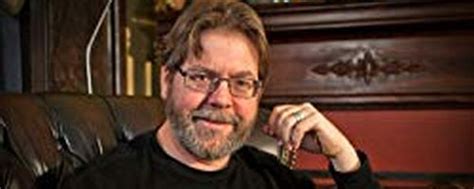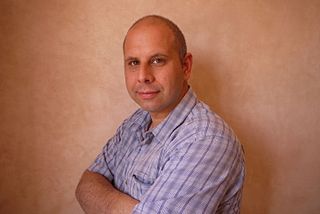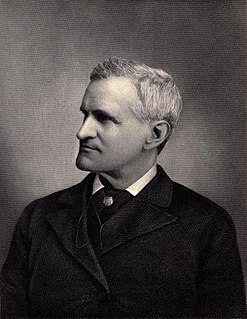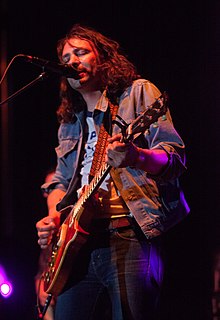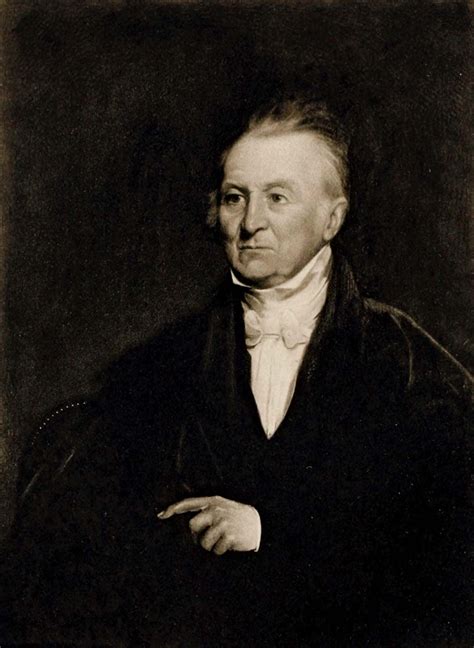Top 511 Haunted Quotes & Sayings - Page 9
Explore popular Haunted quotes.
Last updated on April 20, 2025.
I had refused to pay any attention to the moral laws upon which all our vitality and sanity depend: and so now I was reduced to the condition of a silly old woman, worrying about a lot of imaginary rules of health, standards of food-value, and a thousand minute details of conduct that were in themselves completely ridiculous and stupid, and yet which haunted me with vague and terrific sanctions. If I eat this, I may go out of my mind. If I do not eat that, I may die in the night.
Wickedly Dangerous translates a terrifying figure from folklore , the Baba Yaga, into the smart, resourceful, motorcycle-riding Barbara Yager, who travels with her dragon-disguised-as-a-dog best friend, righting wrongs and helping those in need. But when she stumbles into a town whose children are vanishing, and meets the haunted young sheriff trying to save them, what was a job becomes very personal. This is urban fantasy at its best, with all the magic and mayhem tied together with very human emotions, even when the characters aren't quite human.
To find Margo Roth Spiegelman, you must become Margo Roth Spiegelman. And I had done many of the things she might have done: I had engineered a most unlikely prom coupling. I had quieted the hounds of caste warfare. I had come to feel comfortable inside the rat-infested haunted house where she did her best thinking. I had seen. I had listened. But I could not yet become the wounded person.
The mere mention of the Farakka Express, which jerks its way eastward each day from Delhi to Calcutta, is enough to throw even a seasoned traveller into fits of apoplexy. At a desert encampment on Namibia's Skeleton Coast, a hard-bitten adventurer had downed a peg of local fire-water then told me the tale. Farakka was a ghost train, he said, haunted by ghouls, Thuggees, and thieves. Only a passenger with a death wish would go anywhere near it.
The fact that you couldn't see Alfred Hitchcock's first film The Mountain Eagle, or that you couldn't see so many of F.W. Murnau's masterpieces, or that you couldn't see so many of Oscar Micheaux's really intriguing race melodramas, made with fierce independent spirit against all odds in '20s and '30s America. That stuff haunted me. They really did bring to life a sense of 20th Century history: cultural history, pop history, gender politics and race politics, socio economic history, all that stuff. It was bracing and instructive.
When the long, varnished buds of beech Point out beyond their reach, And tanned by summer suns Leaves of bright bryony turn bronze, And gossamer floats bright and wet From trees that are their own sunset, Spring, summer, autumn I come here, And what is there to fear? And yet I never lose the feeling That someone else behind is stealing Or else in front has disappeared; Though nothing I have seen or heard, Makes me still walk beneath these boughs With cautious step as in a haunted house.
The protagonist of Fourteen Stories, None of Them Are Yours doesn’t make it easy for us, channeling as he does Barry Hannah and Denis Johnson by way of Rick Bass and Dennis Hopper, and self-presenting as yet another damaged romantic who thinks it’s always time to play the cowboy, skating in and out of sense. He can’t see right, and he’s haunted by nearly everything. He’s trying to open up or shut himself down or at least get a hold of himself. He’s trying to make do with what he’s done, while he reminds us that we’re all, one way or another, in that position.
I remember it made me feel better because so many of my friends at school. Were doing that stuff and doing that stuff on sleep overs. But I just didn't feel ready. It wasn't like I had any judgment of it being two women. It would have scared me as much if not more. I was like a three month period in which all the words sleep over was code for was "let's get together and touch each other's vaginas." and I was. Haunted. And I remember going home and feeling like I couldn't tell my mother even though she would've understood and probably laughed.
If he looked into her face, he would see those haunted, loving eyes. The hauntedness would irritate him - the love would move him to fury. How dare she love him? Hadn't she any sense at all? What was he supposed to do about that? Return it? How? What could his calloused hands produce to make her smile? What of his knowledge of the world and of life could be useful to her? What could his heavy arms and befuddled brain accomplish that would earn him his own respect, that would in turn allow him to accept her love?
The Spanish voyager, as his caravel ploughed the adjacent seas, might give full scope to his imagination, and dream that beyond the long, low margin of forest which bounded his horizon lay hid a rich harvest for some future conqueror; perhaps a second Mexico with its royal palace and sacred pyramids, or another Cuzco with its temple of the Sun, encircled with a frieze of gold. Haunted by such visions, the ocean chivalry of Spain could not long stand idle.
Blackened skeleton arms of wood by the wayside pointed upward to the convent, as if the ghosts of former travellers, overwhelmed by the snow, haunted the scene of their distress. Icicle-hung caves and cellars built for refuges from sudden storms, were like so many whispers of the perils of the place; never-resting wreaths and mazes of mist wandered about, hunted by a moaning wind; and snow, the besetting danger of the mountain, against which all its defences were taken, drifted sharply down.
People just like the thrill of anything. Dangerous things and dark things are exciting. Like as a kid, I knew I wasn't going to get killed if I went into the Haunted House but you kind of feel like you are. And when it comes out the track the other side, it's like, "we're still alive"! And I find it really funny when adults get really scared because I've not been really scared since I saw Jaws when I was a little kid. I just think people like the thrill of it, they like to feel like they accomplished something, that they survived the movie.
Do what he will, he [the profane man] is an inheritor. He cannot utterly abolish his past, since he himself is a product of his past. He forms himself by a series of denials and refusals, but he continues to be haunted by the realities that he has refused and denied. To acquire a world of his own, he has desacralized the world in which his ancestors lived; but to do so he has been obliged to adopt an earlier type of behavior, and that behavior is still emotionally present in him, in one form or another, ready to be reactualized in his deepest being.
A change fell upon all things. Strange brilliant flowers, star-shaped, burst out upon the trees where no flowers had been before. The tints of the green carpet deepened; and when, one by one, the white daisies shrank away, there sprang up, in place of them, ten by ten of the ruby-red asphodel. And life arose in our paths; for the tall flamingo hitherto unseen, with all gay glowing birds, flaunted his scarlet plumage before us. The golden and silver fish haunted the river.
And pomp, and feast, and revelry, With mask, and antique pageantry, Such sights as youthful poets dream On summer eves by haunted stream. Then to the well-trod stage anon, If Jonson's learned sock be on, Or sweetest Shakespeare, Fancy's child, Warble his native wood-notes wild, And ever, against eating cares, Lap me in soft Lydian airs, Married to immortal verse Such as the meeting soul may pierce, In notes with many a winding bout Of linked sweetness long drawn out.
I usually know the general emotion of a song, or the general feeling of it, and then I think I just get so excited by the act of recording. I love that process so much that I feel like if I knew exactly what I wanted I'd arrive at something too soon. Part of the reason I work on stuff for so long is just because I love working on it. It's not that I'm haunted by some ghost sound. I just have nothing else to do with my life. Some people like to obsessively shop online. I like to obsessively rack up studio bills.
For my own part I would as soon be descended from that heroic little monkey, who braved his dreaded enemy in order to save the life of his keeper; or from that old baboon, who, descending from the mountains, carried away in triumph his young comrade from a crowd of astonished dogs-as from a savage who delights to torture his enemies, offers up bloody sacrifices, practices infanticide without remorse, treats his wives like slaves, knows no decency, and is haunted by the grossest superstitions.
How was it that he haunted her imagination so persistently? What could it be? Why did she care for what he thought, in spite of all her pride in spite of herself? She believed that she could have borne the sense of Almighty displeasure, because He knew all, and could read her penitence, and hear her cries for help in time to come. But Mr.Thornton-why did she tremble, and hide her face in the pillow? What strong feeling had overtaking her at last?
It seems to me that the desire to make art produces an ongoing experience of longing, a restlessness sometimes, but not inevitably, played out romantically, or sexually. Always there seems something ahead, the next poem or story, visible, at least, apprehensible, but unreachable. To perceive it at all is to be haunted by it; some sound, some tone, becomes a torment — the poem embodying that sound seems to exist somewhere already finished. It’s like a lighthouse, except that, as one swims towards it, it backs away.
This soldier, I realized, must have had friends at home and in his regiment; yet he lay there deserted by all except his dog. I looked on, unmoved, at battles which decided the future of nations. Tearless, I had given orders which brought death to thousands. Yet here I was stirred, profoundly stirred, stirred to tears. And by what? By the grief of one dog. Napoleon Bonaparte, on finding a dog beside the body of his dead master, licking his face and howling, on a moonlit field after a battle. Napoleon was haunted by this scene until his own death.
Until you have a son of your own . . . you will never know the joy, the love beyond feeling that resonates in the heart of a father as he looks upon his son. You will never know the sense of honor that makes a man want to be more than he is and to pass something good and hopeful into the hands of his son. And you will never know the heartbreak of the fathers who are haunted by the personal demons that keep them from being the men they want their sons to be.
In Middle America men are awakening. Like awkward and untrained boys we begin to turn toward maturity and with our awakening we hunger for song. But in our towns and fields there are few memory haunted places. Here we stand in roaring city streets, on steaming coal heaps, in the shadow of factories from which come only the grinding roar of machines. We do not sing but mutter in the darkness. Our lips are cracked with dust and with the heat of furnaces. We but mutter and feel our way toward the promise of song.
The past is never dead. It's not even past. All of us labor in webs spun long before we were born, webs of heredity and environment, of desire and consequence, of history and eternity. Haunted by wrong turns and roads not taken, we pursue images perceived as new but whose providence dates to the dim dramas of childhood, which are themselves but ripples of consequence echoing down the generations. The quotidian demands of life distract from this resonance of images and events, but some of us feel it always.
If we can't think for ourselves, if we're unwilling to question authority, then we're just putty in the hands of those in power. But if the citizens are educated and form their own opinions, then those in power work for us. In every country, we should be teaching our children the scientific method and the reasons for a Bill of Rights. With it comes a certain decency, humility and community spirit. In the demon-haunted world that we inhabit by virtue of being human, this may be all that stands between us and the enveloping darkness.
He went to bed early, but could not fall asleep. He was haunted by sad and gloomy reflections about the inevitable end- death. These thoughts were familiar to him, many times had he turned them over this way and that, first shuddering at the probability of annihilation, then welcoming it, almost rejoicing in it. Suddenly a peculiarly familiar agitation took possession of him... He mused awhile, sat down at the table, and wrote down the following lines in his sacred copy-book, without a single correction.
There is a deep sense in which we are all ghost towns. We are all haunted by the memory of those we love, those with whom we feel we have unfinished business. While they may no longer be with us, a faint aroma of their presence remains, a presence that haunts us until we make our peace with them and let them go. The problem, however, is that we tend to spend a great deal of energy in attempting to avoid the truth. We construct an image of ourselves that seeks to shield us from a confrontation with our ghosts. Hence we often encounter them only late at night, in the corridors of our dreams.
Certain miracles that I beheld there have haunted my memory ever since: a gray April morning of sirocco, when the almond blossoms, the flaming tulips, the young green of the vines, hung as if painted on the motionless air; a summer night when the roses had an unearthly pallor under a half-eaten moon, whose ghostliness was somehow one with their perfume and with the phosphorescence of dew tipping their petals; a day when the trees stood part submerged in fog, into which leaves dropped slowly, slowly, one after another, and sank out of sight.
When you think about normal advertising, it's just like, hey, here's a car and, you know, we don't know if you're looking for a car or not. So Google promised that mental state, and then were able to prove that delivering the message at the exact right moment would make someone click on something. So they pioneered the idea that advertising could be profitable on the internet, that a specific, very micromental state could be targeted. And they established the primacy of the click, which has haunted us ever since.
I first read Freud's famous case study on hysteria based on his client Ida Bauer when I was in my twenties. It pissed me off so badly it haunted me for 25 years. But I had to wait to be a good enough writer to give Ida her voice back. And I had to go get my own first too. I not only know the case study inside and out, like most women, I lived a version of it. Maybe it's time for us to tell our versions.
Then take me disappearin' through the smoke rings of my mind, Down the foggy ruins of time, far past the frozen leaves, The haunted, frightened trees, out to the windy beach, Far from the twisted reach of crazy sorrow. Yes, to dance beneath the diamond sky with one hand waving free, Silhouetted by the sea, circled by the circus sands, With all memory and fate driven deep beneath the waves, Let me forget about today until tomorrow.
Haunted Gulp down your wine, old friends of mine, Roar through the darkness, stamp and sing And lay ghost hands on everything, But leave the noonday's warm sunshine To living lads for mirth and wine. I met you suddenly down the street, Strangers assume your phantom faces, You grin at me from daylight places, Dead, long dead, I'm ashamed to greet Dead men down the morning street.

